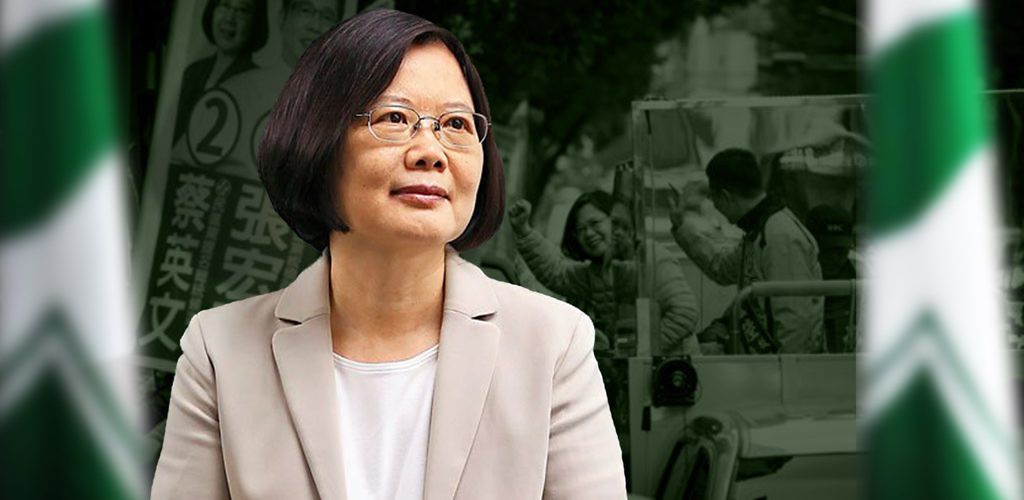Tsai Ing-wen, president-elect of Taiwan. January 16, 2016. (Voice of America
After nearly eight years of relative tranquility in the Taiwan Strait, voters on January 16th handed Taiwan’s Democratic Progressive Party (DPP) a potentially disruptive strong mandate. The island nation not only elected the country’s first female president, but also gave the pro-Taiwan DPP control of parliament for the first time ever.
Occurring just two months after the historic meeting between Chinese President Xi Jinping and Taiwan’s outgoing Ma Ying-jeou in Singapore, the landslide for Tsai Ing-wen and the DPP has prompted fears that relations between the two sides could quickly sour. However, early signs suggest that Taipei and Beijing may be willing to act pragmatically.
The Kuomintang (KMT), which on Saturday suffered its worst electoral defeat in history, has long been regarded as the party that can best ensure peace and stability in the Taiwan Strait. Since the election of President Ma in 2008, Taipei and Beijing have signed a total of 22 agreements, lifted many restrictions on bilateral investment, and allowed millions of tourists to cross the strait annually.
Ma, who came to power vowing to improve strained relations with China—which regards Taiwan as a Chinese province—consolidated his image as a peacemaker in early November 2015 when he met with Xi. It was the first time the leaders of both sides had met since the creation of the People’s Republic of China in 1949.
Notwithstanding this belief abroad that Ma was the architect of peace, his image domestically was badly damaged by a series of crises over wealth inequality, a stagnant economy, lack of government accountability, and a fixation on China that alarmed many Taiwanese. The population feared the impact that rapprochement risked having on the island’s sacred liberal-democratic way of life. Evidence of eroding freedoms in Hong Kong—in addition to a crackdown on activists, lawyers, and journalists across China—further put into doubt the wisdom of seeking closer ties with Beijing.
Handicapped by Ma’s low approval rates, the KMT entered the electoral campaign by positioning itself as a champion of stability and warned that a DPP administration under Tsai would plunge the China relationship into instability. The KMT presented the Ma-Xi summit as evidence of what could be accomplished if it remained in power, and accused Tsai of refusing to recognize the “’92 consensus” that has served as a platform for dialogue between the two sides, and which Beijing has been set as a precondition for talks. The KMT’s fear tactics were, moreover, amplified throughout the electoral campaign by the insistence among officials in Beijing that Tsai’s refusal to recognize the consensus could result in a total collapse of negotiation channels.
Tsai, whose DPP is certainly not “anti China,” as some media have mistakenly reported, deflected the criticism by insisting that she would maintain the status quo in the Taiwan Strait—regarded as the safest position by a majority of Taiwanese—and to use “accumulated outcomes” as a basis to constructively engage Beijing. Moreover, she argued that the ‘92 consensus, which contains a problematic reference to “one China” that is unacceptable to her support base, was only one option to conduct relations with Beijing. Regardless of Beijing’s seeming intransigence, Tsai’s assumption seemed to be that it could be pragmatic and creative enough to meet her halfway if and once she was elected.
Tsai’s landslide victory thus gave the mandate she needed to approach China with confidence and the ability to stand firm on the fundamentals that are non-negotiable to the Taiwanese, such as protection of their nation’s democratic system. The strategy seems to have worked: one day after her convincing victory, a number of Chinese academics were quoted as saying that the ‘92 consensus—which just a few weeks prior had been regarded as a strict precondition of cross-strait dialogue—was not indispensable after all. They argued that the substance of future exchanges mattered more than the symbolism attached to specific terminology. This was, interestingly, exactly what Tsai had been arguing all along.
Tsai has also told Taiwanese media that she does not deny that discussions between the two sides took place in 1992 and that the meeting is a historical fact, during which “both sides had a common agreement to set aside differences and seek common ground.” Given this, Taipei and Beijing could conceivably interpret differently what constitutes the consensus and thereby arrive at an acceptable political foundation, or framework for the continuation of cross-strait dialogue.
A former head of the Mainland Affairs Council and trade negotiator, Tsai has also said that she is not opposed to meeting with the Chinese leader if certain conditions are met. Opinion polls already indicate that under the right circumstances a majority of Taiwanese favor such meetings between their president and his or her Chinese counterpart.
Although Ma’s meeting with Xi set a precedent, the departing leader’s low popularity and high public distrust—not to mention the meeting’s timing two months prior to the elections and six months before he steps down—meant that the exercise did not have the significance that such an encounter should have. With a strong mandate, a pragmatic approach, and having demonstrated that she will not compromise on the core values of Taiwan’s 23 million people—which includes reassuring a segment of the Taiwanese public that is wary of any talks with China—it is not unimaginable that Tsai could meet her Chinese counterpart at some point.
Relations across the Taiwan Strait will remain cordial and constructive even under a DPP administration in Taipei as long as both sides are flexible enough and realize that conflict is in nobody’s interest. This will also be contingent on the ability of Beijing, whose Marxist-Maoist ideological leanings often can militate against pragmatism, to understand the consolidation of identity and values in democratic Taiwan, where support for unification is at an all-time low.
J. Michael Cole is a Taipei-based Senior Non-Resident Fellow with the University of Nottingham’s China Policy Institute, and editor-in-chief of Thinking Taiwan. The views expressed here are his alone. @JMichaelCole1





